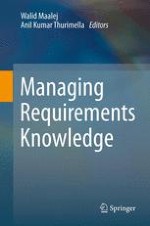2013 | OriginalPaper | Chapter
15. Experience-Based Requirements Engineering Tools
Authors : E. Knauss, S. Meyer
Published in: Managing Requirements Knowledge
Publisher: Springer Berlin Heidelberg
Activate our intelligent search to find suitable subject content or patents.
Select sections of text to find matching patents with Artificial Intelligence. powered by
Select sections of text to find additional relevant content using AI-assisted search. powered by
